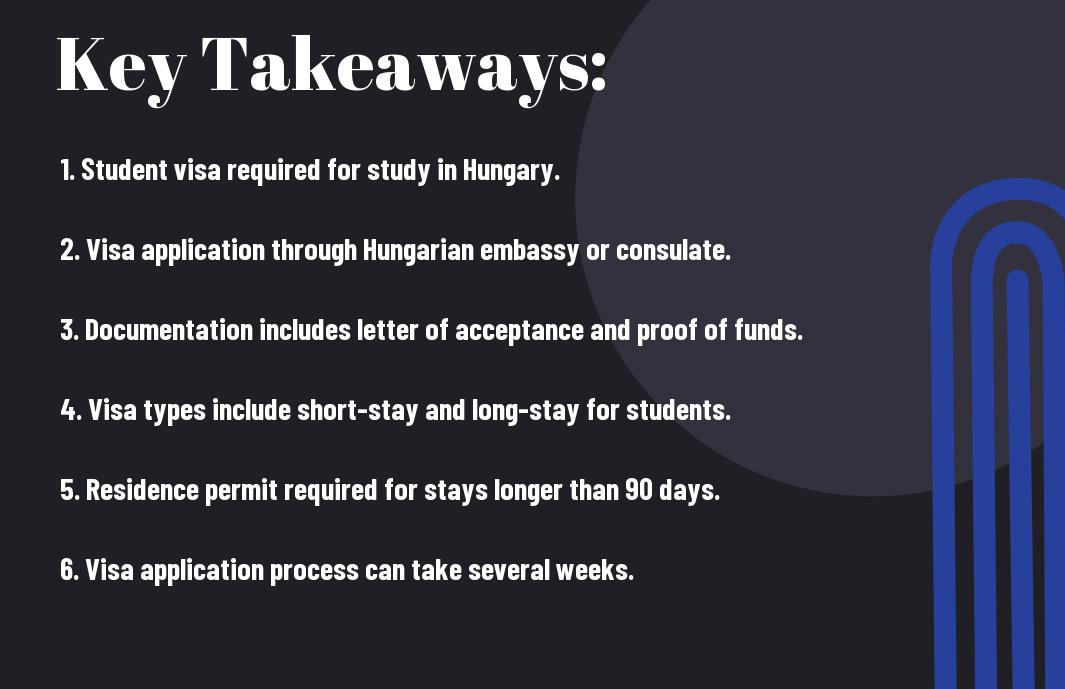Obtaining the right student visa is crucial for international students looking to study in Hungary. With its rich history, top-notch educational institutions, and vibrant culture, Hungary is an attractive destination for students from all over the world. However, navigating the visa application process can be complex and overwhelming. In this blog post, we will go over the different types of student visas available for those wishing to study in Hungary, and provide you with the essential information you need to ensure a smooth and successful application process.
Understanding the Hungarian Education System
A key factor in obtaining a student visa for Hungary is understanding the country’s education system. Hungary has a well-established and reputable education system that offers a wide range of study programs at various educational institutions.
Types of Educational Institutions in Hungary
In Hungary, there are several types of educational institutions that cater to different levels of education, including universities, colleges, and vocational schools. Additionally, there are specialized institutions for subjects such as performing arts, sports, and agriculture. Each type of institution offers a unique learning experience and a variety of programs to choose from, providing students with diverse options for their academic pursuits.
- Universities
- Colleges
- Vocational schools
- Specialized institutions
- Wide range of programs
Any international student exploring opportunities in Hungary should carefully consider the type of educational institution that best aligns with their academic and career goals.
Degree Programs and Language Requirements
One of the key considerations for studying in Hungary is understanding the degree programs available and any language requirements. Hungarian institutions offer a variety of undergraduate and graduate programs in fields such as business, engineering, arts, and sciences. It is important for prospective students to carefully review the language requirements for their chosen program, as some may be delivered in Hungarian while others are offered in English or other languages.
Plus, students should be aware of any additional language proficiency exams or certifications required for admission, such as the TOEFL or IELTS, depending on the language of instruction.
Types of Student Visas in Hungary
Obviously, when planning to study in Hungary, it is vital to understand the types of student visas available. The type of visa you require will depend on the duration and nature of your studies in Hungary. Here are the different types of student visas you may need:
| Short-Term Study Visas (C-visa) | For students engaged in short-term programs or language courses |
| Long-Term Study Visas (D-visa) | For students pursuing degree programs or research in Hungary |
| Student Visa for Internship (D-visa) | For students undertaking internships as part of their studies |
| Visa for Family Members of Students | For spouses and dependents of students studying in Hungary |
| Visa for Post-Graduate Job Search (D-visa) | For graduates who wish to stay in Hungary after completing their studies to seek employment |
Short-Term Study Visas (C-visa)
With a Short-Term Study Visa (C-visa), students can participate in short-term programs or language courses in Hungary. These visas are suitable for individuals who intend to study in Hungary for a period of up to 90 days. The application process for a Short-Term Study Visa is relatively straightforward, but it is essential to ensure all required documentation is in order before applying.
Long-Term Study Visas (D-visa)
For students planning to pursue degree programs or research in Hungary, a Long-Term Study Visa (D-visa) is necessary. The application process for a Long-Term Study Visa is more complex and may require additional documentation, such as acceptance letters from Hungarian educational institutions and proof of financial means. It is imperative for students to begin the application process well in advance to ensure timely approval of their visas.
Types of Long-Term Study Visas include visas for internships, family members, and post-graduate job search. Each type of visa has specific requirements and it is essential for students to carefully review the conditions and prepare the necessary documentation accordingly. Failure to comply with visa requirements may result in delays or rejection of the visa application.

The Application Process for Hungarian Student Visas
Now that you have decided to study in Hungary, it is important to understand the application process for obtaining a student visa. The Hungarian student visa application process can seem daunting, but with the right guidance and preparation, it can be a smooth and straightforward experience.
Required Documentation
Visas for studying in Hungary require certain documentation to be submitted with the application. Some of the required documents include a completed visa application form, a valid passport, proof of acceptance to a Hungarian educational institution, proof of accommodation in Hungary, proof of financial means to support yourself during your studies, and a medical certificate. It is important to carefully review the specific requirements for your visa type and ensure that all documentation is accurate and up to date.
Step-by-Step Application Procedure
With the student visa application procedure, it is important to understand the step-by-step process to ensure that you submit a complete and accurate application. The following table outlines the key steps in the Hungarian student visa application process:
| Step | Description |
| 1 | Complete the visa application form |
| 2 | Gather required documentation |
| 3 | Submit application and pay visa fee |
| 4 | Attend visa interview (if required) |
| 5 | Wait for visa approval |
It is essential to follow each step carefully and ensure that all requirements are met to avoid any delays or complications in the visa application process. Additionally, staying informed about any updates or changes to the application procedure is crucial for a successful outcome.
Living in Hungary as an International Student
To truly immerse yourself in the Hungarian study experience, it’s essential to consider the practical aspects of living in the country. As an international student, you’ll need to navigate issues such as accommodation, living expenses, cultural adaptation, and support networks.
Accommodation and Living Expenses
Living in Hungary as an international student requires careful consideration of accommodation and living expenses. There are various options available, including university dormitories, private rentals, and homestays. It’s important to research and compare different options to find the best fit for your preferences and budget. Additionally, you’ll need to factor in living expenses such as groceries, transportation, and leisure activities. Understanding the cost of living in Hungary will help you to effectively budget for your time as a student.
Cultural Adaptation and Support Networks
Hungary boasts a rich cultural heritage and a welcoming attitude towards international students. However, cultural adaptation and establishing support networks are essential for a fulfilling experience. In Hungary, there are various resources and support networks available to assist international students in adjusting to their new environment. It’s important to engage with these networks and connect with other international students to build a sense of community and receive guidance on cultural integration. Building relationships with local and international students can enrich your experience and provide valuable support throughout your time in Hungary.
International students in Hungary can benefit from orientation programs, language courses, and guidance from university staff to facilitate their cultural adaptation. Additionally, seeking out local cultural events and exploring Hungarian customs and traditions can enrich your experience and help you feel more connected to your new surroundings.


Conclusively,
It is essential for individuals planning to study in Hungary to obtain the appropriate student visa. This process involves meeting the criteria and requirements set by the Hungarian government and the chosen educational institution. By understanding the different types of student visas available and the specific regulations governing them, students can ensure a smooth transition into their academic endeavors in Hungary. It is crucial to conduct thorough research and seek guidance from the respective Hungarian embassy or consulate to determine the most suitable student visa for their educational pursuits. Overall, obtaining the correct student visa is a crucial step in pursuing academic opportunities in Hungary and should be approached with careful consideration and preparation.


